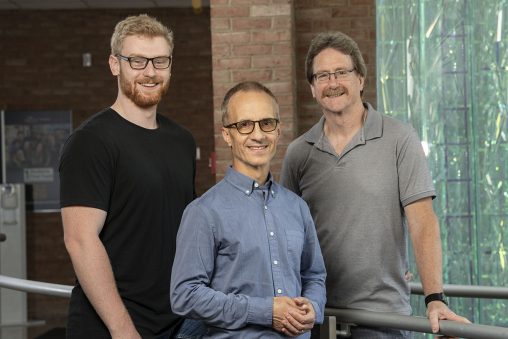
From left: Preston Menke, a human factors and industrial/organizational psychology Ph.D. student; Ion Juvina, associate professor of psychology; Scott Watamaniuk, Ph.D., professor of psychology and Ph.D. student Jeri Carson (not pictured) are analyzing data to predict when pilots and drivers are fatigued.
Researchers in Wright State University’s Department of Psychology have received a $200,000 grant to identify eye movement and physiological indicators of fatigue and drowsiness in pilots and motorists. The project is called OPTICS – Ocular and Physio-Temporal Indicators of Cognitive State.
“Of particular interest are the indicators that can be assessed in real time and used to detect and predict sub-optimal or unsafe performance,” said Ion Juvina, Ph.D., associate professor of psychology at Wright State. “The most predictive indicators and metrics will be integrated and presented on the dashboard of an alert system that can inform operators when they are likely to be in, or they are at risk of approaching, an unsafe or suboptimal mental or cognitive state.”
Wright State is partnering with Kairos Research, Sinclair Community College and the Dayton Entrepreneurs Center on the project.
The 18-month project is funded by the project lead Kairos Research through the Ohio Federal Research Network’s (OFRN) Round 6 Opportunity. OFRN Round 6 is focused on expanding Ohio’s research and development capabilities across the state’s academic institutions and businesses in support of Ohio-based Department of Defense federal partner needs and promoting Ohio’s economic growth.
Also involved in an advisory role are the Air Force Research Lab (AFRL) at Wright-Patterson Air Force Base and the Naval Medical Research Unit in Dayton.
“Our team is tasked with running an experiment, working with our partner the AFRL and analyzing data related to mental state and eye movement and psychological indicators,” Juvina said. “We analyze the data and model the data so we can predict fatigue and any loss of vigilance while they do those tasks.”
He said the idea is to make pilots and motorists, for example, aware of fatigue and take measures to protect themselves.
“Aside from protecting operators of airplanes and cars, the project’s goal is to drive innovation and facilitate research and development projects that are focused on job growth and workforce development in Ohio,” Juvina said.
Working with Juvina at Wright State are Scott Watamaniuk, Ph.D., professor of psychology, and human factors and industrial/organizational psychology Ph.D. students Preston Menke and Jeri Carson.
Carson said the team strives to achieve the project’s goal by producing a statistical model for pilots, drivers and those who monitor their performance to predict cognitive states.
Menke helps facilitate experiments at the Air Force Research Lab. The Air Force has a longstanding interest in fatigue and human performance, which, Menke said, benefits Wright State through collaboration opportunities.

 Adventures await
Adventures await  Wright State to expand nursing facilities to meet workforce needs and prepare more graduates for in-demand careers
Wright State to expand nursing facilities to meet workforce needs and prepare more graduates for in-demand careers  Wright State student-athletes make a lasting impact on local family with more to come
Wright State student-athletes make a lasting impact on local family with more to come  Wright State names Rajneesh Suri dean of Raj Soin College of Business
Wright State names Rajneesh Suri dean of Raj Soin College of Business  ‘Only in New York,’ born at Wright State
‘Only in New York,’ born at Wright State 